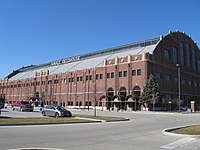The Butler Way
The Butler Way is a term used since the 2006-2007 men's NCAA college basketball season by broadcasters and sportswriters nationwide to describe the governing philosophy of the Butler Bulldogs, one of the most successful former mid-major programs.[1] [1] [2] The Butler Way demands commitment, denies selfishness and accepts reality, yet seeks constant improvement while promoting the good of the team above self.
History of the term
The Butler Way was originally forged by Butler University's legendary coach and administrator Tony Hinkle.[2]
Butler Bulldogs' Athletic Director Barry Collier[3] is often credited with resurrecting the term and its underlying attitude during his time as the Butler University Men's Basketball coach from 1989 through 2000.[4][5]
The five principles
The Butler Way has become closely associated with the five principles of Butler Basketball. The five principles as posted in the Men's Basketball locker-room are as follows:
- Humility - know who we are, strengths and weaknesses
- Passion - do not be lukewarm, commit to excellence
- Unity - do not divide our house, team first
- Servanthood - make teammates better, lead by giving
- Thankfulness - learn from every circumstance
See also
References
- ^ See, e.g., "'Butler Way' includes sense of urgency," David Woods, USA Today (Updated 2/15/2007 1:11 PM ET).
- ^ "A Message From The AD," Barry Collier (`76), Director of Athletics (ButlerSports.com 2007).
- ^ "Barry Collier Bio"
- ^ "There's no 'I' in Butler," Archived 2007-03-03 at the Wayback Machine Matt Gonzales, INtake Weekly Magazine (Updated 3/1/2007).
- ^ 2007 Indiana newspaper article Archived 2007-09-27 at the Wayback Machine

